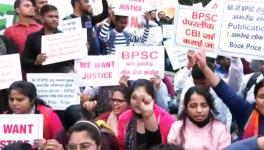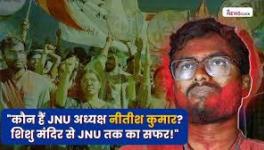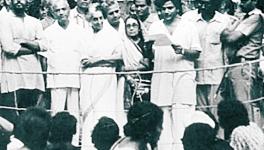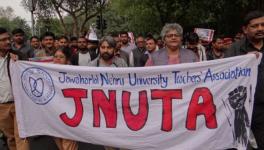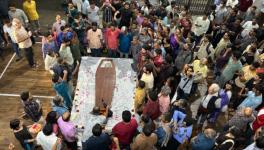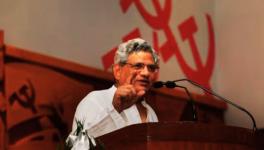JNU VC Hits Another Academic ‘Low’: Skype To Replace Viva Voce Examination in Research
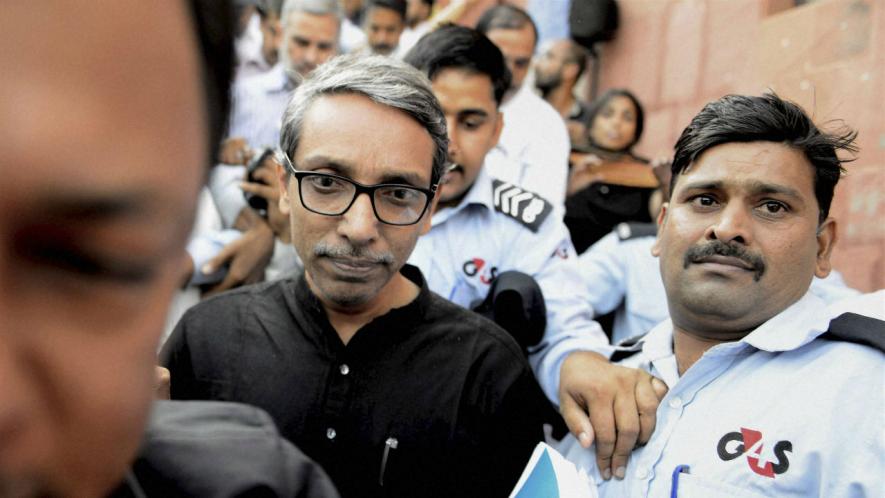
Image Courtesy: Firstpost
Jawaharlal Nehru University Vice Chancellor M.Jagadesh Kumar has come out with yet another decision to whittle down the standards of excellence that the university had achieved over decades. He has now cancelled all mandatory public viva voce for research and directed the faculty to conduct this only on Skype.
JNU Teachers Association has “rejected” the proposal at a meeting today, adopting a resolution to this effect.
The decision that has left the faculty aghast has serious repercussions for the students as it rules out interaction, ends transparency, and excludes those who live in remote areas and do not have Skype. But according to the faculty this completely downgrades research and along with a series of such decisions---many of them betraying an authoritarian approach such as the VC’s recent mandate making attendance compulsory for scholars---will effectively lower the academic standards of JNU.
The general body of JNUTA met to “strongly condemn the ongoing efforts of the Vice-Chancellor of JNU to further the destruction of the research culture and administration that he has already wreaked.” And rejected the proposal in its entirety.
JNUTA passed a resolution stating, “ Whether this comes from a fundamental lack of acquaintance with the joys of learning and thinking freely, or from some darker malefic motivation, the recent diktat on "Skype vivas" by the Vice-Chancellor strikes at the heart of what makes a research meaningful in a university.”
It described the Skype directive to be a “ludicrous proposal, stemming from on a very limited understanding of the viva voce as simply a verdict or grade.”
JNUTA listed the reasons for rejecting the proposal as:
No university that claims the highest standards can treat a dissertation defence as an empty formality rather than the rigorous oral examination it is, one which results in mutual edification of both the candidate and the examiners, as well as the gathered audience (particularly students). Subjecting this transformative, intersubjective engagement to the vagaries and limitation of technology and internet connectivity is completely unwarranted, disrespectful of scholarship and the value of an education in the effective communication of research results. A student’s viva voce examination is part of her education; it is only partly a test and is mostly a reward, insofar that it affords her the opportunity to have an established scholar engage with her work in depth. Such proceedings must be conducted in a setting most conducive for this interaction.
Contrary to the impression sought to be conveyed, several vivas using video chat software have already been conducted in some exceptional circumstances, and the experience has not been one that supports a general use of the technology, as replacive of the in-person viva voce. Picture and sound quality, particularly voice clarity, varies sharply through any such communication, the presentation by the student simultaneously to a public audience and the examiners is rendered difficult, and in general, the overlapping and back and forth nature of such an interaction is severely inhibited. While the JNUTA General Body believes that the option of a viva voce by video chat should be retained, it should not, and cannot, be made the norm.
The JNUTA General Body also points out that making the online mode the norm shall effectively restrict the pool of scholars to whom dissertations may be sent for examination in two ways. First, given the poor penetration of the internet in general, and the unavailability of internet services in most universities and institutes outside the major metropolitan cities, entails that examiners from outside these areas cannot be appointed. Second, not all potential examiners even in the major cities will be willing/able to conduct viva voce examinations by video chat — they may have privacy concerns or may simply be unacquainted/ uncomfortable with this particular mode of communication.
It should also be noted that the hallowed UGC Regulations 2016 make explicit recommendations on the how the public viva voce for an M.Phil./PhD should be conducted, in which the online option is not prescribed.
The JNUTA GBM also strongly condemns the fact that the VC's diktat has brought the ongoing process of viva voce examinations to a grinding halt. Viva voce examinations have been cancelled in the School of Social Sciences in particular across the university, there is uncertainty as to whether and how dissertations for which reports are in will be examined at all in this semester. This derailing of well-functioning processes must stop at once and in-person viva voce examinations for dissertations already submitted must resume.
The JNUTA General Body calls on all Centres/Schools to discuss this matter in depth and to forward its resolutions to the JNU administration and the Committee that has been established for working out the modalities of online viva voce.
In a second Resolution JNUTA expressed its resolve not to cooperate with the attendance penalty being imposed on students and teachers. It opposed the “preposterous declaration” of making attendance compulsory for all categories of students.
Disclaimer: The views expressed here are the author's personal views, and do not necessarily represent the views of Newsclick.
Get the latest reports & analysis with people's perspective on Protests, movements & deep analytical videos, discussions of the current affairs in your Telegram app. Subscribe to NewsClick's Telegram channel & get Real-Time updates on stories, as they get published on our website.










